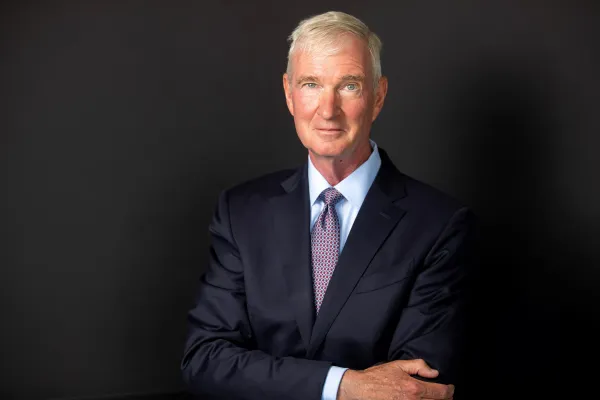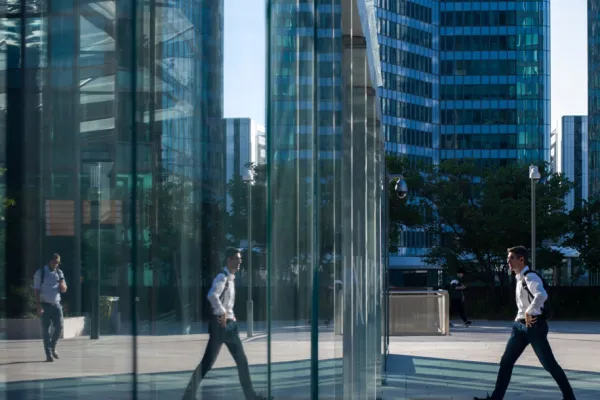Saudi Arabia’s stock exchange, the Saudi Exchange, is looking to solidify its infrastructure with the creation of a holding company called Saudi Tadawul Group. The Group includes four subsidiary companies – the exchange itself, a securities depository center (Edaa), a securities clearing center (Muqassa), and a newly created technology services company called Wamid. The strategic rationale behind this conversion is to establish a synergistically integrated group of companies that will operate efficiently within and across the organization.

Ultimately, the transformation is intended to provide a stronger platform for the group’s IPO, scheduled for later this year, according to Saudi Tadawul Group Chairperson Sarah Al-Suhaimi and CEO Khalid Al-Hussan.
“The new structure will enable us to deliver high-quality services across all our business lines, increase our competitiveness, and align our capital market with the rapid growth of emerging markets,” Al-Hussan says. “I’m confident that Saudi Tadawul Group and its subsidiary companies will shape what comes next in terms of capital market development in Saudi Arabia, serving as the bridge connecting global investors and regional economies.”
Four underlying companies
A closer look at these subsidiaries gives some context to Al-Hussan’s optimism. The Saudi Exchange is the largest exchange in the region and with an approximate $2.5 trillion market capitalization, one of the top 10 stock exchanges in the world. Public Investment Fund (PIF) – the sovereign wealth fund of Saudi Arabia – owns the exchange, which traded $557 billion in shares during 2020. That figure represents a 137%1 increase over 2019. The 204-member Tadawul All Share Index is up about 32% in 2021. And despite global concerns about the Covid pandemic, the 2020 IPO market remained robust, with four companies on the exchange raising a combined $1.45 billion2. In addition to its size, the market boasts high liquidity.In a discussion about the strategy, Mohammed Al-Rumaih, former chief of markets and now CEO of the Saudi Exchange, indicated in a post on the STG website that the exchange plans to shape the future of capital market development in Saudi Arabia by introducing best-in-class financial instruments across all asset classes, backed by an innovative and strong market infrastructure. It’s an ambitious goal, and one that aligns directly with the core mission of the Kingdom’s Vision 2030 plan to modernize its economy and reduce its dependence on oil.
The second pillar of Saudi Tadawul Group is Edaa, its securities depository center company. An established entity within the Saudi capital market, Edaa connects issuers and investors while providing seamless and secure operations. It also has a successful track record of connecting with global depository centers while functioning as a trusted liquidity hub in the region.
Edaa facilitates the procedures needed to execute transactions across the exchange's markets in alignment with international standards. Its capabilities enable the transactions of equity, debt, bonds, Sukuk, ETFs, REITs, mutual funds, and other financial instruments traded on the Saudi Exchange. Edaa is led by Raed Ibrahim Al-Humaid, who brings 20 years of capital markets experience to the role. He has held several leadership positions at Saudi Arabia’s Capital Market Authority and most recently served as the CMA Deputy for Market Institutions.
Muqassa is the Group’s securities clearing center company. Its vision and mission both speak to providing reliability and stability in the marketplace. In order to achieve these initiatives, Muqassa strives to improve market efficiency, reduce counter-party risk, and help introduce new products and services. The creation of Muqassa is one of the key initiatives of Vision 2030’s Financial Sector Development Program and, notably, Saudi Arabia’s Capital Markets Authority authorized the clearing house as the first qualified central counterparty in the Kingdom. The company will retain its existing leadership team under the new Group structure, including CEO Wael Abdullah Al-Hazzani.

Innovation unit looks to create value
Wamid is Saudi Tadawul Group’s dedicated technology services company. It was created to strengthen the Group’s infrastructure and leverage data and creativity to solve problems and boost economic growth. The newly created entity is led by market veteran Mohammed Al Nory, who has nearly 15 years of banking and capital markets experience.Wamid delivers solutions for the financial sector and beyond through innovative solutions and digitalization. Its strategic focus is on providing access to data and enhancing the technology offering available to both current and future stakeholders.
New opportunities for global investors
While the Group’s transformation and potential IPO should create varied opportunities for investors, analysts are watching specific sectors and niches. “As retail trading investors make up the largest part of trading on the Saudi Stock Exchange, institutional investors should view the IPO as a bet on growth of financial services targeting middle- and high-income households in Saudi Arabia,” says Arthur Budaghyan, Chief Emerging Markets Strategist at BCA Research.Further, the entire Saudi Arabian economy stands to benefit if the transformation initiatives and IPO improve corporate governance and transparency, Budaghyan adds. “That would really increase the standing of Saudi Arabia as a destination for global equity flows and many international investors will be willing to invest.”
It’s just this type of enthusiasm the Group is counting on as it works towards its public listing. Chairperson Al-Suhaimi calls the initiative a significant achievement on the exchange’s journey to transform Saudi Arabia’s economy. “Comprehensive capital market reforms are not only prudent, but essential to ensuring higher economic growth,” she says. “And achieving the nation-wide goal of the successful delivery of Saudi’s Vision 2030.”
Creating an investor-friendly nation
Indeed, several initiatives in the Kingdom’s Vision 2030 plan seek to cement Saudi Arabia’s place as a global market leader and advanced capital market within a decade’s time. “The Vision 2030’s high-level objective is to have an attractive capital market that is open to the world – period,” says Al-Hussan. To achieve this, making Saudi Arabia a more investor-friendly entity has been a national priority.“We’ve been carefully listening to international investors during our growth transformation,” Al-Hassan says, adding that the Kingdom is implementing seismic changes based on the feedback, not just minor adjustments. “We’re tapping into regulatory frameworks, operational aspects, promotions, and much more across all sectors and all areas to support positioning Saudi Arabia as an attractive destination for investors.”
Many smaller but equally important changes, including setting up a dedicated team that caters to international investors, asset managers, index providers, and brokers, in addition to managing international outreach efforts, are making Saudi Arabia more appealing for global investors. The Exchange also plans to expand its team to operate in international locations, starting in London later this year.
Such efforts are already producing results, says Al-Hussan. “We have seen a big increase in the number of qualified foreign investors in Saudi Arabia,” he says, noting that this group reached more than 2500 investors in early July 2021 and continues to grow weekly. “Cash flows to the Saudi capital market from foreign institutional investors that recently joined the market are massive,” he adds. Since the implementation of Tadawul’s Qualified Foreign Investor program in June 2015, their ownership reached a total of $60.9 billion as of the end of August 2021. Most investment currently comes from the UK, Europe, and the US, and efforts to increase Asian participation are underway.
Domestically, smaller and mid-size companies in Saudi Arabia will also benefit from efforts to simplify and ease the experience of doing business in the Kingdom. The Saudi government has launched many initiatives to enable and empower SMEs, including making changes to financing regulation and other pivotal areas, according to Al-Suhaimi. “I think this will provide a boost to SMEs,” she says.
Historic growth paves way for 2030 goals
“Saudi Tadawul Group is among the top 10 largest markets in the world today, and by 2030, I hope we will be able to move to the top five,” Al-Suhaimi says. If that ascent seems ambitious, consider the growth of investment banking in the last several years alone. “Investment banking almost did not exist in Saudi Arabia in 2014,” she notes. That was the year Al-Suhaimi took the helm of SNB Capital (formerly NCB Capital), the largest asset manager in the Middle East. “It was a very successful journey for us,” she says. Looking forward, Saudi Tadawul Group’s transformation and restructuring efforts seek to empower the entire Saudi capital market to achieve a similar magnitude of growth in the decade ahead.“Today, we feel we are much stronger and much more robust to do business and to provide services within the investment globe,” says Al-Hussan. “We believe that this is the start of our new chapter and the Saudi Arabia capital market is going to be a very tough competitor within the region and in the world.”
Learn more about the Saudi Exchange and the Saudi Tadawul Group.
1 Source: Bloomberg, April 2021
https://www.bloomberg.com/news/articles/2021-04-07/saudi-stock-exchange-revamps-corporate-structure-targeting-ipo
2 Source: Arab News, June 2021
https://www.arabnews.com/node/1877771/business-economy






